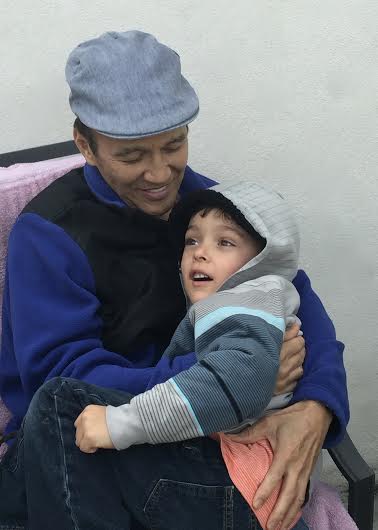What Does It Take?
By S M Chen, posted July 18, 2017 “Virtue is the truest nobility.” — Miguel de Cervantes Saavedra (1547-1616), Spanish novelist
I read with some interest a 5/10/17 post at Adventist Today entitled “Adventist Pastor and Wife Declare Love for Trans Daughter.” I do not know the couple in question and have no intention of impugning them. I commend their declaration of love for their daughter.
I do wonder if their acceptance of those in the LGBTQ community is greater now that their own daughter is part of that community. It would only be natural.
Some parents in similar circumstance have turned their back on offspring whose orientation did not coincide with their own expectations, creating a rift that may prove irreparable.
One might think Christians would not do such a thing. One would be wrong.
Christ, on whose life and teachings Christians ostensibly base their faith, never rejected those whose actions he did not sanction. He always loved the sinner.
Think Mary Magdalene. Think Simon the leper. Think the Samaritan woman at the well. Think Judas Iscariot. Think the penitent thief on Golgotha. Think Peter. And countless others.

Sinners who responded to that love had hearts of stone transformed into hearts of flesh.
Those who did not continued to harbor hearts of stone, which only became more ossified as a consequence of that rejection and ultimately stopped beating.
The difference?
Hearts of flesh will one day beat forever.
***
A recent issue of TIME magazine reports that politics and its fallout sometimes makes for strange bedfellows.
The attempted repeal of the Affordable Care Act (aka “Obamacare”) has brought together those who might seem otherwise diametrically opposed.
Angela Lorio is a Republican who voted for our current POTUS and watches Fox News. Jessica Michot supported Hillary Clinton and views MSNBC.
Lorio and Michot both live in Louisiana, a scant dozen miles apart.
They were brought together by opposition to the proposed repeal and replacement of ACA for personal reasons: both have 4 year old sons with serious medical problems, and both stand to suffer economically if ACA is replaced with the healthcare plan as currently configured.
Not that their reasons are illegitimate. Far from it.
It is commendable that these mothers care for their children, both physically and emotionally.
As one of them says, “This isn’t about parties and how you voted. This is about saving lives.”
The friendship of the two women seems genuine and transcends party affiliation and world and national view.
One might think it sad it took this degree of personal crisis to bring them together, but at least, for the moment, they are together.
***
A few years ago an acquaintance and I, who hadn’t seen each other in years, met and conversed. She professed to a form of generic Christianity and seemed devout, even fervent, about certain matters.
Then the issue of homosexuality somehow came up. Her repugnance was immediate and almost palpable.
“Can you imagine,” she asked, “what these people do?”
“I choose not to.” If I don’t dwell on the permutations of heterosexuality, why should I with alternative sexuality?
She snorted.
Slim and still somewhat attractive, she was almost certainly the covert mistress of an older, wealthy man of whom she spoke obliquely. If they had perused The Kama Sutra together it would not have surprised me.
Was this an instance of the black line between pot and kettle being (conveniently) blurred?
It seems the cautionary mote and beam of Holy Writ yet has applicability today.
***
There are those who do not need the proverbial chickens to come home to roost in order to possess thinking that appears to run contrary to self-interest.
Some examples from current films (a spoiler alert may be in order):
In Beatriz at Dinner, a poor legal Mexican massage therapist, whose size of heart exceeds that of her purse, engages in spirited discussion with an arrogant billionaire dinner guest whose ruthlessness is exceeded only by his ego. At the end of their contentious conversation, rather than stabbing the obnoxious tycoon with a letter opener (as she briefly fantasizes doing), the masseuse leaves the tow truck transporting her broken down VW and walks alone into the sea. She is not going for a nocturnal swim.
In Wonder Woman, a female protagonist with super powers is in a position to take the life of an evil Nazi scientist (who, if anyone does, deserves such a fate). However, declaring that love, not hate, is the greatest force in the universe, the heroine does not.
And in War for the Planet of the Apes, a simian who has been tortured by his nemesis, a deranged human in military uniform, has an opportunity to exterminate the latter. He holds the weapon pointed at the colonel but, despite all that has gone before, does not pull the trigger. Instead, he puts the gun down.
Imaginary? Of course.
But art does recapitulate life. And the more closely it does, the longer we remember.
***
I am reminded of the nobility of David, who was in a position to harm a sleeping King Saul, who had sought David’s life on more than one occasion. David would not. Not once, but twice.
And of Jean Valjean, protagonist of Les Miserables, who could have taken the life of Inspector Javert, who had pursued Valjean without relent (intending that he return to prison) but did not press his advantage. Rather, Valjean lets Javert escape.
***
Justice, in the end, prevails.
The deranged alpha male, reminiscent of the character Kurtz in Joseph Conrad’s Heart of Darkness, turns the pistol on himself.
In a losing battle, unable to persuade his armor bearer to commit homicide, Saul falls on his own sword.
Inspector Javert drowns himself in the Seine.
They all occupy space on the same continuum of universal consequence.
Hate ultimately cannot stand the sight of itself in the mirror held up by love.
We are all in need of help. It is indeed fortunate redemption exists.
All we need do is inch along the tightrope stretched across a dark chasm whose depth we do not know, without an apparent safety net.
Only the gift includes a safety net, and we can fall only so far. We will not be tempted beyond the point of endurance.
And, at the other end of the rope, beyond the blackness, is light.
***
It seems only fitting the same grace bestowed on us with such love and beneficence would be extended by us to our fellow pilgrims.
Indeed, this concept is of such primacy we ignore it at our peril. The last verses in Matthew 25 speak to the heart of the matter and bear burnishing in memory.
***
As Christ said to His doubting disciple, Thomas: Blessed are those who have seen – and believed.
Even more blessed are those who have not seen – and yet believed.
 S M Chen lives and writes in California.
S M Chen lives and writes in California.




